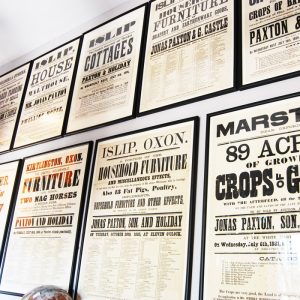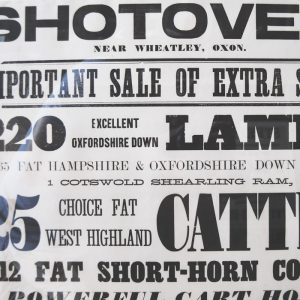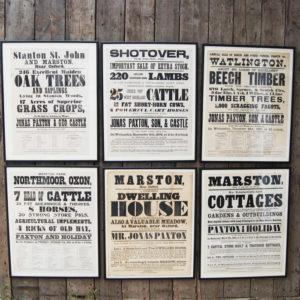No products in the basket.
30th August 2016
Bill Posters will be Prosecuted
Day one of any graphic design course today probably includes a warning to pupils about using too many typefaces in their work. The Victorians however reveled in having their typesetter go through the full gamut of typography in order to fill their advertisements with vibrant and punchy proclamations in all available fonts and typefaces. From the “Wanted – Dead or Alive” posters of the Wild West through to Newspaper Vendors of the West End, 19th Century typesetters seem to have had a great time in print.

LASSCO has just acquired a number of Victorian bill posters of an Oxfordshire auctioneer: Jonas Paxton (d.1886). Paxton seems to have been prolific in the disposal of property, land, stock-in-trade and livestock. We’ve got three dozen posters – now framed. The auctions they promote date from 1862 through to 1894 (with a later one in 1913). Some auctions are house clearances – listing the entire worldly goods of a person deceased. Others are farm sales or the stock-in-trade of businesses. As such these posters, often forced sales, and often listing all lots, remain as poignant historical documents of the time. It is noticeable that the format of the posters hardly changed in that 50year period. Thick with juxtaposed headlines and bullet-points, they clearly worked.

Jonas Paxton was born in Potsgrove, Bedfordshire, and began working as an auctioneer in Bicester in 1838 – his first sale appearing in Jackson’s Oxford Journal on 17th November that year. He later went into partnership with other auctioneers, and his son Thomas became involved. The firm was known as “Messrs. Jonas Paxton, Son, and Castle”, and then “Messrs. Paxton, Son, and Holiday”. A supporter of the Bicester Agricultural and Horticultural Society, and of the Oxfordshire Agricultural Association, Paxton was prominent in securing a railway line between Bletchley, Bicester, and Oxford. Jonas retired in 1883.
Auctions were invariably held at the premises concerned and any printed catalogues were made available via chosen “Inns in the District”. The Three Pigeons at Milton Common, was one of the Inns that Paxton used for promoting his sales – now LASSCO’s own premises. The Spread Eagle in Thame was another (e.g. for a Shotover auction of livestock); The Bear in Woodstock held catalogues for Paxton auctions including those in Kiddington and Kirtlington for which we have posters.
There was nothing Paxton wouldn’t sell. In 1869 at The Red Lion Inn at Islip, Paxton put the entire tangible goods of the local Draper, the late Mrs Smith, under the hammer. The contents of her shop lists bolts of calico, baize, “chints”, alpaca and skeins of worsted – then her personal chattels were sold – her furniture, china, pots, pans and cake-tins from out the back. We have a poster for a sale of a brewery in the same village seven years previous. Paxton staged an annual mid-winter sale of timber at The Hare & Hounds in Watlington (now offices) – in 1881 it included “275 loads of Beech Timber” and “3000 scragging fagots from the Shirburn Estate”. Earlier that year he was in Marston on the outskirts of Oxford selling “Crops of Grass” field by field – “The crops are very good, the land is of superior quality and each ground is watered” – the sale was held at The White Hart Inn nearby. The auctioneers were still going in Edwardian times – when a Mr Parker left his Northmoor farm in 1913, Paxton’s sold the lot: the hens, the geese, the hay-ricks and (Lots 62-68) the horses, namely, Blossom, Flower, Polly, Jack and Tom.
With only a couple of exceptions, all of the posters are printed by the E. Smith print works of Bicester – or T.W.Pankhurst. Thomas William Pankhurst was originally from London. He moved to Bicester, Oxfordshire in around 1870 to join the printers E. Smith and Co. By 1886 the company was named Smith and Pankhurst, with Pankhurst living above the premises. The company was responsible for the re-launch of the Bicester Advertiser in 1879, and the publishing of the Bicester Almanac and Directory.
For posterity, we’re hoping that many of these posters will find their way to the owners and occupants of many of the premises cited – including The Bear – Woodstock, The Hare & Hounds – Watlington (now FlexiOffices), The Marlborough Arms – Woodstock, The Sun Inn – Hook Norton, The Red Lion Inn – Steeple Aston, The Red lion Inn – Islip, The Spread Eagle – Thame, The White Hart Inn – Marston, The Dashwood Arms Inn – Kirtlington and The Manor at Great Tew – part of which is now occupied by Soho Farmhouse. Residents of these villages and towns in particular will find the posters interesting: Eynsham, Islip, Marston, Shotover, Iffley, Kirtlington, Bleddington, Newton Morrell, Steeple Aston, Kiddington, Signett, Bicester, Shotteswell, Stanton St. John, Bloxham and Banbury.
View the posters at LASSCO Three Pigeons or see them catalogued here on our website.

